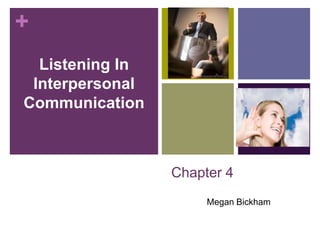
Chapter 4, Comm215
- 1. Chapter 4 Megan Bickham Listening In Interpersonal Communication
- 2. The Process of Listening Stage One: Receiving - You note not only what is said, but also what is omitted. Stage Two: Understanding -You learn what the speaker means, and grasp both the thoughts and emotions expressed. Stage Three: Remembering - Remembering the speakers message Stage Four: Evaluating - Consists of Judging the message in some way Stage Five: Responding - Occurs when the speaker is talking (non-verbal) and afterwards
- 3. Listening Barriers Distractions: - Physical: hearing impairment, noisy environment, or loud music. - Mental: Thinking about upcoming events or becoming too emotional to pay attention to speaker or message. Biases and Prejudices - Biases and Prejudices against group will inevitably distort listening. E.g. gender bias, and closed-mindedness. Lack of Appropriate Focus - It is important to focus on the message as a whole and not allow yourself to become thrown off my small details that may conjure up past memories or other thoughts. Premature Judgment - If you assume you know what the speaker is going to say you are less likely to focus on the message and lose its meaning.
- 4. Culture, Gender, and Listening Culture - 3 factors: - language and speech - nonverbal behaviors - feedback Gender - Women tend to use listening to connect with others and become closer. Men tend to use it to dominate and show their expertise. - Women have very open easy to read verbal cues while men tend to use none at all.
- 5. Effective Styles of Listening Empathetic Listening -Empathy is the ability to understand and feel what someone is going through. If you listen with empathy you can enhance your relationships. Objective Listening -If you are unable to listen with empathy you can listen objectively. You need to identify why the person feels the way they do and recognize things such as paranoia or self-hatred. Nonjudgmental Listening - Listen for understanding and withhold judgment Critical Listening - Remember to keep and open mind, but listen critically to evaluate and respond to the message. Surface Listening - Taking a message for face value without trying to understand the underlying meaning.
- 6. Effective Styles of Listening, Con’t Depth Listening - Paying attention to the underlying meaning behind a message. It isn’t always direct. Active Listening - Sending back feedback, nonverbal and verbal, to the speaker regarding their message.